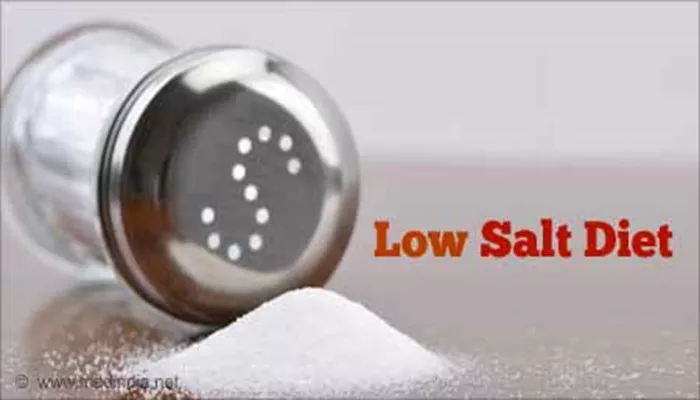Heart failure (HF) is a chronic and progressive condition that affects millions of individuals worldwide. It occurs when the heart cannot pump blood effectively, leading to symptoms such as fatigue, shortness of breath, and fluid retention.
Managing heart failure requires a multifaceted approach, including medication, lifestyle changes, and dietary modifications.
Among these, a low-sodium diet has been widely recommended as a crucial component of heart failure management. This article will explore the importance of sodium restriction in heart failure, the mechanisms by which it affects the cardiovascular system, and the current evidence surrounding dietary sodium intake recommendations for patients with heart failure.
Sodium And Its Role in Heart Health
Sodium is an essential mineral that plays a vital role in maintaining fluid balance, nerve function, and muscle contractions.
However, excessive sodium intake can lead to various health issues, particularly in individuals with heart failure. High sodium consumption is associated with increased blood pressure and fluid retention, both of which can exacerbate heart failure symptoms.
SEE ALSO: Why Does Orthopnea Occur in Heart Failure?
Mechanisms of Sodium Impact on Heart Failure
Fluid Retention: High sodium intake leads to increased water retention in the body. This excess fluid can accumulate in various tissues, causing swelling (edema) and increased workload on the heart. In patients with heart failure, where the heart’s pumping ability is already compromised, this additional strain can worsen symptoms and lead to hospitalizations.
Increased Blood Pressure: Sodium plays a significant role in regulating blood pressure. When sodium levels are high, the body retains more water to dilute the sodium concentration in the bloodstream. This increased blood volume raises blood pressure, putting further stress on an already weakened heart.
Hormonal Changes: Excessive sodium intake triggers hormonal responses that can lead to increased levels of hormones such as aldosterone and renin. These hormones promote sodium retention and further fluid buildup, creating a vicious cycle that exacerbates heart failure symptoms.
The Importance of A Low-Sodium Diet for Heart Failure Patients
Reducing Hospitalizations
One of the primary goals in managing heart failure is to reduce hospitalization rates due to exacerbations of symptoms.
Studies have shown that patients adhering to a low-sodium diet experience fewer hospitalizations related to heart failure complications. By limiting sodium intake to less than 2,000 milligrams per day (or even lower for some patients), individuals can significantly decrease their risk of fluid overload and related hospital visits.
Improving Quality of Life
A low-sodium diet not only helps manage physical symptoms but also contributes positively to the overall quality of life for heart failure patients. Reduced fluid retention can lead to improved mobility, decreased discomfort from swelling, and enhanced exercise tolerance. Patients often report feeling better and more capable of engaging in daily activities when they adhere to dietary recommendations.
Supporting Medication Efficacy
Many patients with heart failure are prescribed diuretics to help remove excess fluid from their bodies. However, high sodium intake can counteract the effectiveness of these medications by promoting fluid retention. By following a low-sodium diet, patients can enhance the efficacy of their prescribed treatments, leading to better management of their condition.
Current Recommendations for Sodium Intake
Historically, recommendations for sodium intake have varied based on individual patient needs and clinical guidelines. The general consensus suggests that most adults should limit their sodium intake to less than 2,300 milligrams per day; however, for those with heart failure, stricter limits may be necessary.
Recommended Sodium Levels
General Population: Less than 2,300 mg per day.
Heart Failure Patients: Typically advised to limit sodium intake to less than 2,000 mg per day; some may benefit from even lower limits depending on individual circumstances.
Evidence Supporting Sodium Restriction
Recent studies have highlighted mixed outcomes regarding sodium restriction in heart failure management. Some trials suggest that overly restrictive diets (below 1,500 mg per day) may not provide additional benefits and could even be harmful by increasing mortality rates among certain patient populations. Therefore, it is essential for healthcare providers to tailor dietary recommendations based on individual patient profiles and clinical conditions.
Challenges in Adhering to a Low-Sodium Diet
While the benefits of a low-sodium diet are clear, many patients face challenges in adhering to these dietary restrictions:
Taste Preferences: Many people are accustomed to the taste of salty foods and may find it difficult to adjust their palates.
Food Availability: Processed foods are often high in sodium; thus, access to fresh produce and low-sodium options can be limited in some communities.
Conclusion
A low-sodium diet is an essential aspect of managing heart failure effectively. By reducing sodium intake, patients can alleviate symptoms related to fluid retention and high blood pressure while improving their overall quality of life. Despite mixed evidence regarding strict dietary limits, most guidelines recommend that individuals with heart failure should aim for less than 2,000 mg of sodium per day.
Ultimately, personalized dietary plans developed in collaboration with healthcare providers will yield the best outcomes for patients living with heart failure. Ongoing research is necessary to refine these recommendations further and ensure that they align with patient needs while promoting optimal health outcomes.
Related topics:
- Why Are Nsaids Contraindicated in Heart Failure?
- Why Is Cyclobenzaprine Contraindicated in Heart Failure?
- Why Is Alcohol Bad for Congestive Heart Failure?

